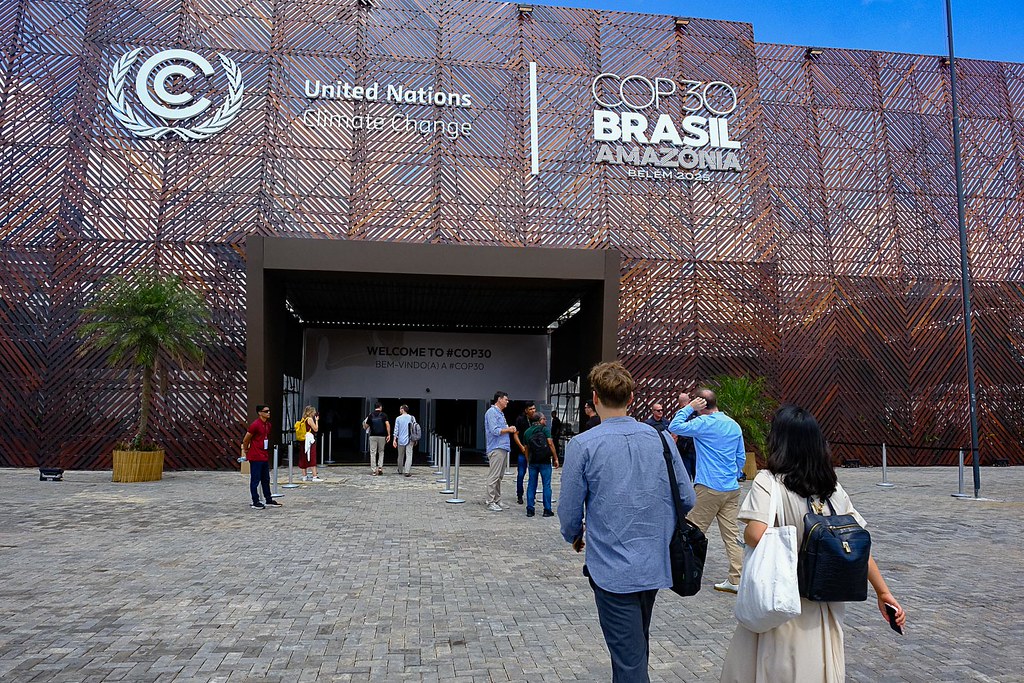COP30: Why local communities must have access to environmental information in data center development
At COP30, Brazil speaks of reforestation and indigenous wisdom. But Bruno Bioni, Mariana Rielli, and Rafael Zanatta argue that the country’s generous tax incentives for data centers must be tied to the collective right of access to environmental information, or risk deepening the very injustices the climate summit seeks to undo.
As global leaders gathered in Brazil for COP30, predicted to be the second largest international climate conference to date, the promises of climate justice echoed through the rainforest, but a quieter battle over environmental transparency was already underway.
In his opening remarks, President Lula da Silva spoke of the centrality of local communities and traditional peoples to a new idea of development, highlighting the intelligence of the forest peoples as an essential component for a new pact on reforestation and a global financial framework to avoid the tragedy of the climate emergency. Ailton Krenak, one of Brazil’s most important intellectuals, frames this vision as “ideas to postpone the end of the world.”
While Lula’s speech invoked forest wisdom and global justice, Brazil’s domestic policies tell a more complex story, especially when it comes to the digital infrastructure quietly reshaping its landscape.
Two months ago, the Workers’ Party government proposed a policy of tax incentives for the installation of data centres in the country, with a significant reduction in taxes for this type of undertaking (“Redata”). In our view, these incentives should be counterbalanced by a set of obligations for the sake of justice. One of these obligations, defended by Data Privacy Brasil, is the commitment to guaranteeing the collective right of access to environmental information for communities affected by data centre projects.
This isn’t just a policy preference, it’s a constitutional imperative. There is ample justification for this idea to be institutionalised. First, because the Brazilian tax system must promote sustainability, an imperative inscribed in the Brazilian Federal Constitution since 2023. Therefore, the normative values of sustainability should guide fiscal policies rather than merely promoting economic growth for either the State or corporations.
Communities need mechanisms for accessing information and must be able to hold companies accountable for the environmental impact of their ventures.
Secondly, the right to access information is integral to the concept of sustainability. Communities and individuals well-informed about shared resources, especially the common goods of water and energy, are fundamental to a democratic idea of sustainability. In a vision centred on the dignity of people, sustainability concerns the capacities for civic action and democratic participation. To this end, communities need mechanisms for accessing information and must be able to hold companies accountable for the environmental impact of their ventures. In the words of Tawfik Jelassi, Assistant Director-General for Communication and Information at the United Nations Educational, Scientific and Cultural Organization (UNESCO), information is power and access to information “is the bridge that allows citizens to demand justice”.
Fortunately, this vision isn’t theoretical. It’s already embedded in international law. This thesis has already been formulated and integrated into a United Nations binding regional treaty, the Escazú Agreement, which provides for collective rights of access to information as a remedy . Brazil participated actively in the negotiation of the treaty at the regional level, and is on track to ratifying it domestically. This represents a different approach from governance tools such as Environmental Impact Assessments, which can be designed to include transparent and participatory measures, but do not necessarily require them, serving as a precautionary governance tool in business-government centred relationships with potential environmental impact. Under Escazú, communities are recognised as rights-holders and must be provided with, and be able to request environmental information.
How can these ideas be implemented in Brazil and other nations?
To bring these principles home, we’ve taken concrete steps. We presented to the Brazilian National Congress a document with more than forty proposals for modifying the Artificial Intelligence Legislation (PL 2338/2023). One of our proposals is the inclusion of a specific chapter on the collective rights of access to environmental information in data centre projects.
In our proposal, associations and entities representing collective and diffuse rights have standing to petition for access to environmental information. This petition can be presented to a company responsible for the construction of a data centre, even those without tax incentives. The company is obliged to provide environmental information, such as that relating to the water use model (e.g. volume, origin, impact on the local community). It is prohibited for the company to use an argument of trade secret to avoid providing the requested environmental information (as occurred in Oregon with Google), considering the fundamental right of citizens to live in a healthy and sustainable environment. The servers are coming. The question is: will transparency follow?
Environmental information is understood as any written, audio, electronic or recorded information relating to the environment and its elements and natural resources, including information related to environmental risks and possible associated adverse impacts that affect or may affect the environment and health, as defined in the Escazú Agreement. We believe that these provisions should be part of the national legislation on Artificial Intelligence and that communities should be empowered to contest detrimental effects produced by data centres. With information, they can demand justice.
If tax incentives support private investment in data infrastructure, they must also guarantee that communities are empowered with information, before, during, and after these projects take shape.
But this isn’t just about definitions, it’s about power. As Brazil positions itself at the centre of the global climate debate, it has the opportunity to transform lofty rhetoric into concrete democratic innovation. If there are projects that use water and energy for transnational data processing, communities in the affected territories must be able to oversight its damages. If tax incentives support private investment in data infrastructure, they must also guarantee that communities are empowered with information, before, during, and after these projects take shape.
Institutionalising collective rights of access to environmental information not only aligns Brazil with its constitutional commitment to sustainability and with the Escazú Agreement, but also ensures that technological progress does not reproduce old asymmetries of power. By linking data centre incentives to transparency and accountability, countries can construct a different development paradigm, one in which environmental justice, democratic participation, and the intelligence of local communities guide the digital economy. If communities are to shape the future, they must first be allowed to see it.
Image credit: ALBERTO CESAR ARAUJO-AMAZONIA REAL
Veja também
-
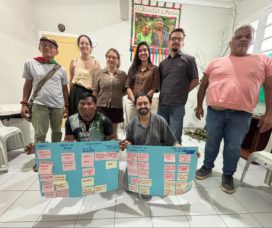
COP30, Data and Land Use: Discussing Agendas to Combat Land Grabbing
On November 12, 2025, Data Privacy Brasil held a roundtable discussion on data and land grabbing as part of the COP do Povo program, a parallel event to COP30, entitled "COP30, Data and Land Use: Discussing Agendas to Combat Land Grabbing,".
-
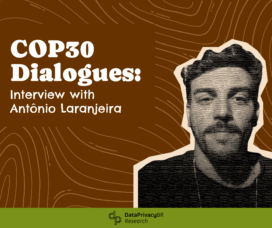
COP30 Dialogues: Interview with Antônio Laranjeira
In the second interview for our special series “COP30 Dialogues: Digital Rights and Climate Justice,” we spoke with Antônio Laranjeira, an award-winning journalist for investigative reporting on topics such as environmental loss and damage, science, and citizenship.
-
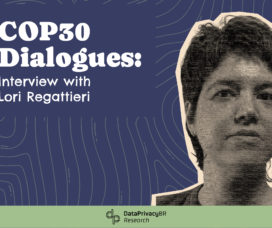
COP30 Dialogues: Interview with Lori Regattieri
Data Privacy Brasil launches the new interview series “COP30 Dialogues: digital Rights and Climate Justice,” aiming to hear diverse voices on the interface between the climate agenda and digital rights. The new project emerges in a unique year: the first United Nations Climate Change Conference (COP30) in Brazil.
-
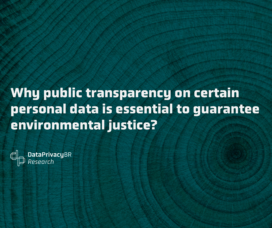
Why public transparency on certain personal data is essential to guarantee environmental justice?
Between 2022 and 2023, Data Privacy Brasil developed the project Environment and Information: contesting the political instrumentalization of LGPD in Environmental Regulation which focuses on the intersection of digital rights and environmental policies.
-
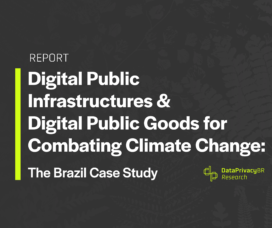
Digital Public Infrastructures & Digital Public Goods for Combating Climate Change: The Brazil Case Study
Data Privacy Brasil, with the support of the Digital Public Goods Alliance (DPGA), launches a new report that aims to analyze the integration between Digital Public Infrastructure (DPI) and Digital Public Goods (DPGs) as tools to combat climate change.
-
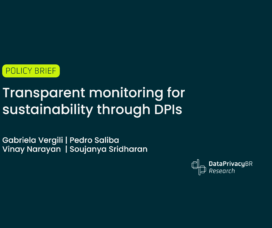
Transparent monitoring for sustainability through DPIs
In this new publication, researchers Gabriela Vergili, Pedro Saliba from Data Privacy Brasil, Vinay Narayan and Soujanya Sridharan from Aapti Institute, discuss the “Transparent monitoring for sustainability through DPIs”.
-
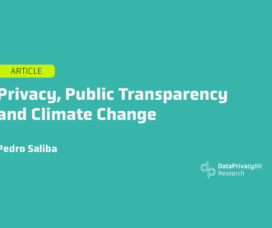
Privacy, Public Transparency and Climate Change
How transparency and data protection can help environmental public policies in Brazil.
Veja Também
-

COP30, Data and Land Use: Discussing Agendas to Combat Land Grabbing
On November 12, 2025, Data Privacy Brasil held a roundtable discussion on data and land grabbing as part of the COP do Povo program, a parallel event to COP30, entitled "COP30, Data and Land Use: Discussing Agendas to Combat Land Grabbing,".
-

COP30 Dialogues: Interview with Lori Regattieri
Data Privacy Brasil launches the new interview series “COP30 Dialogues: digital Rights and Climate Justice,” aiming to hear diverse voices on the interface between the climate agenda and digital rights. The new project emerges in a unique year: the first United Nations Climate Change Conference (COP30) in Brazil.
-

Why public transparency on certain personal data is essential to guarantee environmental justice?
Between 2022 and 2023, Data Privacy Brasil developed the project Environment and Information: contesting the political instrumentalization of LGPD in Environmental Regulation which focuses on the intersection of digital rights and environmental policies.
-

Digital Public Infrastructures & Digital Public Goods for Combating Climate Change: The Brazil Case Study
Data Privacy Brasil, with the support of the Digital Public Goods Alliance (DPGA), launches a new report that aims to analyze the integration between Digital Public Infrastructure (DPI) and Digital Public Goods (DPGs) as tools to combat climate change.
-

Transparent monitoring for sustainability through DPIs
In this new publication, researchers Gabriela Vergili, Pedro Saliba from Data Privacy Brasil, Vinay Narayan and Soujanya Sridharan from Aapti Institute, discuss the “Transparent monitoring for sustainability through DPIs”.
-

Privacy, Public Transparency and Climate Change
How transparency and data protection can help environmental public policies in Brazil.
DataPrivacyBr Research | Content under licensing CC BY-SA 4.0

